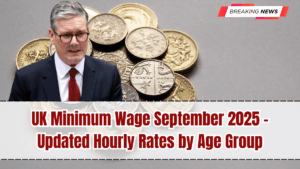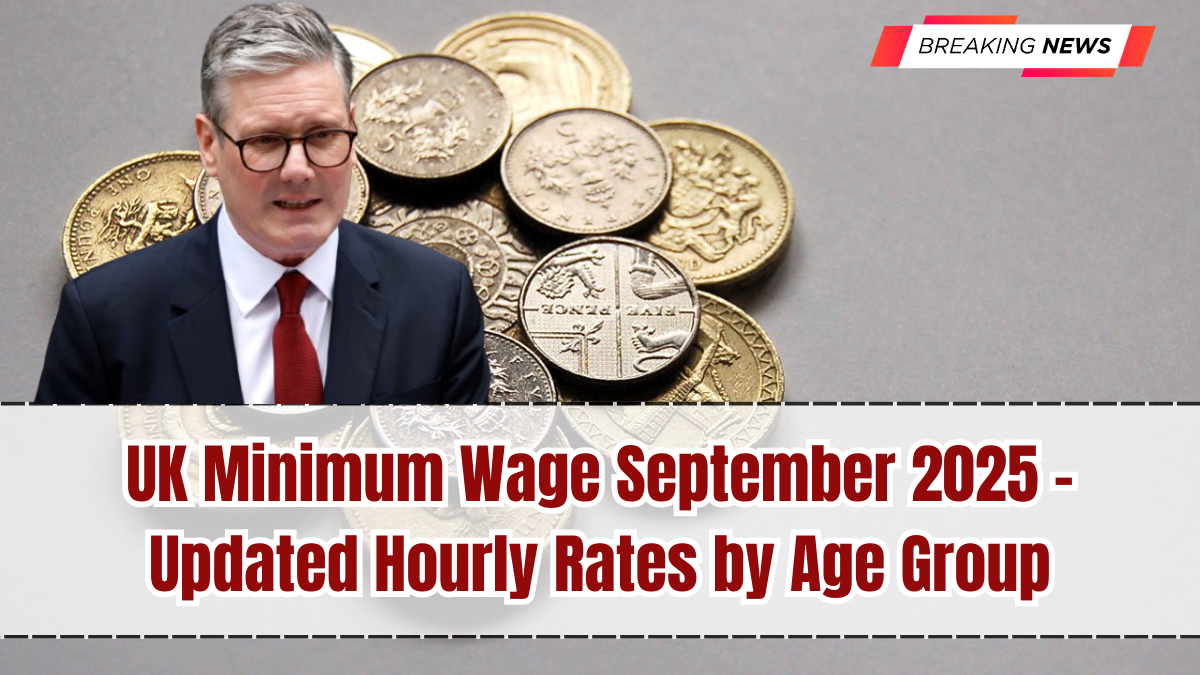The cost of living crisis has been one of the most pressing issues in the United Kingdom, and wage adjustments have become vital to keeping households afloat. To address this, the government has announced a fresh increase in minimum wage levels starting in September 2025. The UK minimum wage September 2025 update brings new hourly rates for workers across different age groups and categories, aiming to provide better protection against inflation and rising expenses.
This adjustment comes after months of consultation with the Low Pay Commission, labor unions, and employers. The goal is to strike a balance between improving workers’ earnings and maintaining economic stability for businesses. For employees, the hike means more disposable income and stronger purchasing power. For employers, it represents a push to adjust wage structures and ensure compliance with labor laws.

Why the Minimum Wage is Changing
The UK minimum wage September 2025 update is driven by several factors. Inflation has pushed up the cost of essentials such as housing, energy, and groceries, making it harder for workers on low pay to get by. At the same time, labor shortages in certain industries have highlighted the need for competitive wages to attract and retain workers.
Raising the minimum wage is also part of the government’s broader strategy to reduce in-work poverty, boost productivity, and create a fairer labor market. By lifting wages, the government hopes to stimulate the economy through higher consumer spending, while ensuring workers are better protected against financial stress.
New Hourly Rates by Age Group
From September 2025, the minimum wage will rise across all age brackets. The updated rates are as follows:
-
National Living Wage (23 and over): £12.20 per hour
-
Ages 21–22: £11.20 per hour
-
Ages 18–20: £8.90 per hour
-
Ages 16–17: £6.80 per hour
-
Apprentices: £6.50 per hour
These increases mark one of the most significant wage adjustments in recent years. For a full-time worker on the National Living Wage, the rise translates to an annual boost of more than £1,000 before tax.
Impact on Workers
For workers, the UK minimum wage September 2025 update is a welcome relief. It means more money in their pockets at a time when food prices and rent continue to rise. Employees in retail, hospitality, and care sectors—industries where many workers are paid close to minimum wage—will particularly benefit from the change.
The increase also reduces reliance on government benefits, as workers are able to sustain themselves better through wages. For young workers and apprentices, the hike acknowledges their contribution and provides them with a stronger start in the labor market.
Impact on Employers
While the wage increase benefits employees, it also presents challenges for employers. Businesses, particularly small and medium-sized enterprises, must adjust payroll budgets to meet the new requirements. Sectors such as hospitality and agriculture, which rely heavily on lower-paid workers, may feel the pressure most.
However, many experts believe the wage increase could lead to higher staff retention, reduced turnover, and improved morale. Over time, better wages can enhance productivity and service quality, which benefits employers as well.
How the Wage Increase Will Be Enforced
The government has confirmed strict enforcement of the UK minimum wage September 2025 update. Employers found paying less than the legal minimum will face penalties, fines, and public naming. Workers are encouraged to check their payslips and report any discrepancies to HM Revenue & Customs (HMRC).
In addition, awareness campaigns will be launched to ensure both workers and employers understand their rights and responsibilities under the new rates.
Why This Matters for the UK Economy
Raising the minimum wage has a ripple effect across the economy. It not only benefits workers directly but also stimulates spending in local communities. With higher earnings, workers spend more on goods and services, supporting businesses and generating tax revenue.
The UK minimum wage September 2025 increase is also part of the government’s long-term plan to align wages with living standards, ensuring fair compensation for work done. While challenges remain for employers, the benefits for workers and society outweigh the short-term adjustments required.
Conclusion
The UK minimum wage September 2025 update represents an important milestone in the UK’s fight against low pay and in-work poverty. With new hourly rates set across all age groups, workers will see meaningful improvements in their take-home pay. Employers must adapt to the changes, but the long-term benefits of fair wages include better productivity, happier staff, and a stronger economy. For workers, this adjustment provides not just financial relief but also recognition of their role in keeping the UK economy running.
FAQs
What is the new National Living Wage in September 2025?
The National Living Wage for workers aged 23 and above will rise to £12.20 per hour.
Do apprentices also benefit from the increase?
Yes, apprentices will see their minimum wage rise to £6.50 per hour.
How will this impact part-time workers?
Part-time workers will also benefit proportionally, receiving the same hourly rates as full-time staff.
What happens if an employer does not comply?
Employers paying below the legal minimum risk heavy fines, penalties, and being named publicly by HMRC.
Why is the minimum wage increase important?
It helps workers cope with rising living costs, reduces in-work poverty, and stimulates economic growth through higher consumer spending.
Click here to know more.
